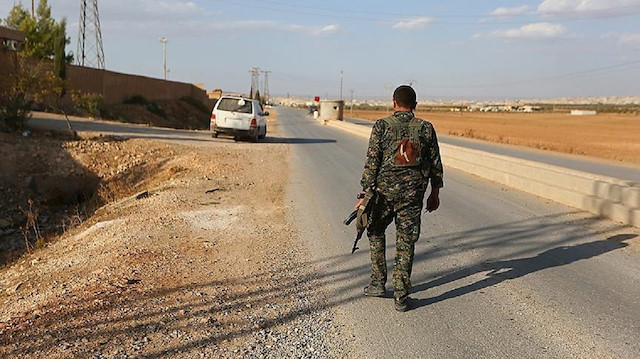

File photo
Terrorist groups made deal to get back 7 US soldiers after September battle, claim sources in Deir ez-Zor, eastern Syria
The terrorist group YPG/PKK made a swap deal with terrorist Daesh to get back seven U.S. soldiers captured by Daesh in eastern Syria, local sources told Anadolu Agency.
In Syria’s oil-rich eastern Deir ez-Zor province, the U.S. soldiers were detained in September during a clash between Daesh and the U.S.-backed YPG/PKK, the Syrian branch of the terrorist PKK, said the sources, who asked not to be named due to security concerns.
With the help of local elements, Daesh and the YPG/PKK began negotiating on Sept. 28 over getting the soldiers back, the sources claimed.
Daesh pressed the YPG/PKK to withdraw from some oil wells including Azraq and allow the entry of some medical supplies as well as food items in some areas in return for releasing the U.S. troops.
Under the deal between the two terrorist groups, the YPG/PKK withdrew from the wells and the U.S. got its soldiers. The medical supplies and food items have not been sent yet, according to the sources.
Coalition denies claims
A spokesman for the U.S.-led international coalition forces denied the claim that Daesh had captured seven U.S. soldiers.
“The coalition is not involved in any deal with ISIS,” said U.S. Col. Sean Ryan, using another acronym for Daesh.
US has admitted previous deal
But the YPG/PKK and Daesh have made previous deals that were reported on.
Last November, the Pentagon defended a PKK/PYD deal to allow hundreds of Daesh terrorists to escape the besieged city of Raqqah.
Pentagon spokesman Eric Pahon said the agreement, which reportedly allowed 250 fighters and 3,500 of their family members to flee on Oct. 12, was part of a “local solution to a local issue,” namely the siege of Daesh’s de facto capital in Syria.
“The central priority here was the protection of civilian lives and the arrangement was reached by our partners and their local affiliates,” he told Anadolu Agency at the time.
Since this Sept. 11, Daesh and the YPG/PKK have been trading blows, especially in Deir ez-Zor’s rural Hajin district, which is located in the east of the province.
Despite getting support from both the U.S. and France, the YPG/PKK has consistently failed to make any gains, with the group only holding positions briefly before being forced to retreat in the face of fierce counterattacks by Daesh.
According to the latest estimates, the YPG/PKK currently holds about 28 percent of Syria’s territory.
Daesh, for its part, still maintains an active presence in three parts of Syria, accounting for roughly 3.3 percent of the country’s total territory.
Calling the PYD/PKK-led umbrella group the SDF a "reliable partner" in its fight against Daesh, Washington continues to provide it with arms and equipment, even as Turkey stresses its terrorist identity.
In its more than 30-year terror campaign against Turkey, the PKK -- listed as a terrorist organization by Turkey, the U.S. and the EU -- has been responsible for the death of some 40,000 people, including women and children. The YPG is its Syrian branch.
#Daesh
#YPG/PKK



